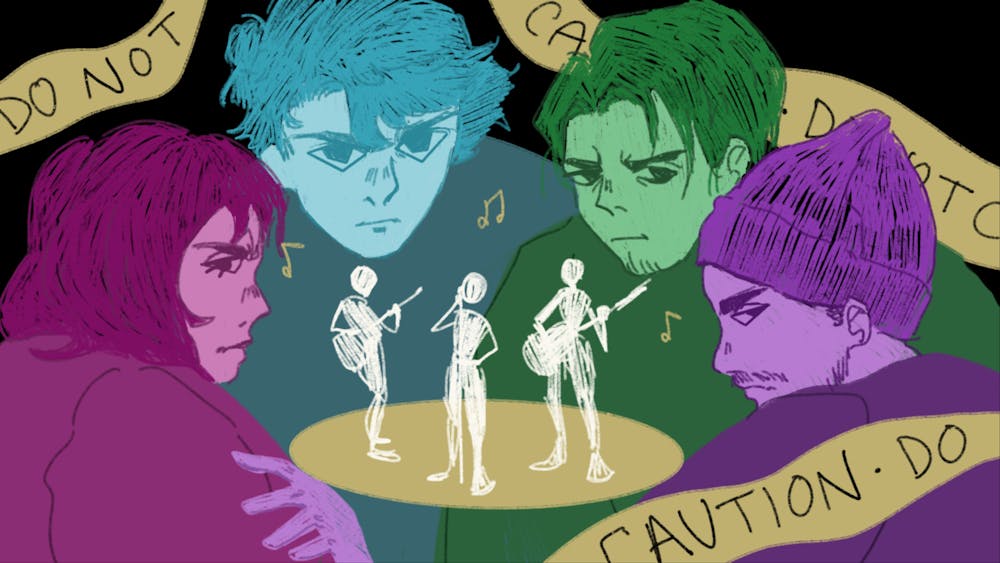In these times of turmoil, upheaval, and rights reversals, there are only a few things more horrifying than seeing your favorite indie artist blow up on TikTok. The songs you used to secretly bump in the car seem to have gained 200,000 more listens on Spotify overnight. Some part of your heart hurts every time you scroll through your For You page and hear the remixed version of “Softcore” by The Neighbourhood. “I was here first,” you think. “This new generation can’t appreciate music like I can,” you think.
It’s a common sentiment that we’ve all felt at some point: discovering a song that others don’t know about or forming a connection with an underground artist. While music is fundamentally meant to be experienced by many, an emotional attachment to a particular song or an obscure music group with a three–word name (looking at you, Neutral Milk Hotel) seems to transcend any positive feelings associated with sharing. Why is our attachment to music (that only we supposedly know about) so strong that its later popularity garners such a negative reaction?
Her Campus, an online magazine with a female college student demographic, was just as curious as I am. They asked college students across the country what they thought the purpose of gatekeeping was. According to a University of Kansas student, the concept is tied to the idea that an artist becoming super popular would mean they could become “uncool.” So, preventing others from finding the music means that people can keep the artist all to themselves.
The idea that increased exclusivity is inversely proportional to how cool it is to enjoy something is less individual and more societal. Yet, the notion of keeping music to oneself has interesting psychological implications. For example, finding out that your favorite artist gained popularity can be accompanied by parasocial jealousy—jealousy that that artist’s attention is now divided among a larger fanbase. Gatekeeping is a widespread social occurrence for a reason, and this has to do with TikTok being the premier social media platform for popularizing under–the–radar music.
When music we gatekeep is inserted into the soundtracks of popular movies or television shows, the response almost never includes lamenting that the music is becoming uncool. British singer Kate Bush’s 1985 single “Running Up That Hill” has enjoyed a resurgence in popularity since it was featured in Season 4 of Stranger Things—but the ‘80s music gatekeepers only came out of the woodworks when it blew up on TikTok. While the drill remix admittedly went a bit overboard, the negative reaction to the song's TikTok popularity wouldn’t have been nearly as extreme if the resurgence of this song came from any other platform.
Maybe it’s TikTok’s association with the “uncool,” the vapid, and teenage girls that’s brought us to this point. If a song that you found first can be discovered by the same people that lose all composure when BTS comes into town, then that means your tastes overlap with a historically “tasteless” demographic.
The collective vilification of something that teenage girls love or use regularly is nothing new; we’ve all lived through the Twilight and One Direction eras—the eras of embarrassment over reading young adult romance novels in public and hiding the Wattpad on your phone screen. Similarly, TikTok is seen as an app for young girls, and music targeted toward young girls has never been valued as “art” in the same way that rock or indie have been seen.
We’re conditioned to view the interests of teenage girls as the product of inexperience and immaturity. As girls who still haven't reached the cusp of "maturity," we’re slowly taught to grow up in shame and hide if we share some of those interests. We're sniveling. We're emotional. We’re led to believe that teenage girls will bring the same level of incoherence and the same lack of understanding that’s been plaguing them for ages to music that deserves a “more refined” ear. And so when songs blow up on TikTok, the gatekeeping brigade stands at the ready, in their battle stances, desperately trying to keep the music they love away from the teenage girls they love to villainize even more.
Music brings people together; emphasis on individual taste can make us forget that. Enjoying music with friends and family creates unforgettable memories, and there are few better feelings in a lifetime. There’s no valid reason to bar TikTok users—and to bar young women—from feeling the same way.

